|
Report from
Europe
UK tropical wood and wood furniture imports at all
time low in 2023
In 2023, the UK imported 395,500 tonnes of tropical wood
and wood furniture products with a total value of $940
million, respectively 13% and 33% less than the previous
year.
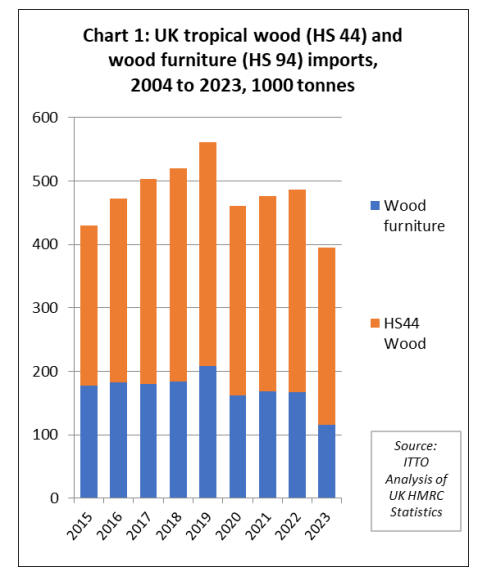
In tonnage terms this was the lowest on record, 8% less
than the previous low of 430,000 tonnes in 2015 (Chart 1
above). This is around half the level of tropical wood
imports into the UK typical two decades ago before the
2007-2008 recession.
UK imports of tropical wood and wood furniture in the
fourth quarter of 2023 were 87,834 tonnes, lower even
than the 89,111 tonnes imported in the second quarter of
2020 when the country was at a standstill during the first
COVID lockdown. The fourth quarter figures were 16%
down on the previous quarter, and 2% less than same
period the previous year.
Underlying the historically low levels of import is the
weakness of the UK economy. According to the Office of
National Statistics, the UK economy was in recession in
the second half of 2023, shrinking by 0.1% in the third
quarter and by 0.3% in the fourth quarter.
Due to stronger growth in the first two quarters of 2023,
GDP in the UK is estimated to have increased by just
0.1% over the full year. The Bank of England predicts the
UK economy will grow by just 0.25% in 2024.
The UK Construction Products Association Winter
Forecast predicts growth in the UK building sector in
2024, but by only 0.6%. This follows a contraction of
4.7% in 2023. “Both private housing and private housing
repair, maintenance and improvement are forecast to be
the worst affected by the prevailing economic conditions
of flatlining growth, stubborn inflation and interest rates
remaining [relatively high] throughout 2024,” said the
CPA.
UK import value of tropical wood furniture down 43%
year-on-year
Of all wood products imported into the UK from the
tropics, furniture declined the most last year. The UK
imported USD420 million of tropical wood furniture
products in 2023, 43% less than the previous year. In
quantity terms, wood furniture imports were 115,700
tonnes in 2023, 24% less than in 2022.
Tropical wood furniture imports in 2023 decreased for all
leading supply countries to the UK including Vietnam (-
40% to USD220 million), Malaysia (-32% to USD88
million), India (-41% to USD47 million), Indonesia (-40%
to USD42 million), Thailand (-48% to USD12 million),
and Singapore (-88% to USD6.6 million) (Chart 2).
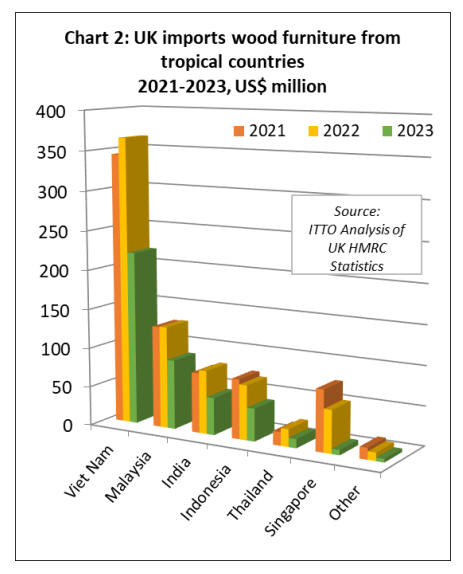
UK joinery imports decline from all leading tropical
supply countries
Total UK import value of tropical joinery products fell
27% to USD196 million in 2023 and import quantity was
down 14% to 69,800 tonnes. UK import value of joinery
products from Indonesia (mainly doors) was USD96
million in 2023, down 30% year-on-year.
Imports from Malaysia (mainly laminated products for
kitchen and window applications) fell 28% to USD27
million in 2023. UK import value of Chinese tropical
joinery products, nearly all doors, was USD22 million in
2023, 30% less than the previous year. UK import value
on joinery products from Vietnam declined 7% to USD8
million during the year (Chart 3).
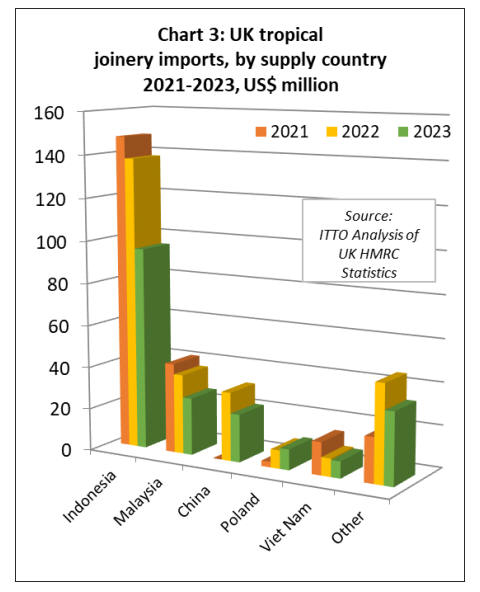
UK direct imports of tropical hardwood plywood offset
by rise from China
In 2023, the UK imported 203,600 cu.m of tropical
hardwood plywood, 1% less than the previous year.
Import value fell more sharply, by 29% to USD188
million. A large decline in direct imports of higher-value
tropical hardwood plywood from tropical countries was
offset by a rise in imports of lower-value plywood with an
outer layer of tropical hardwood from China (Chart 4).
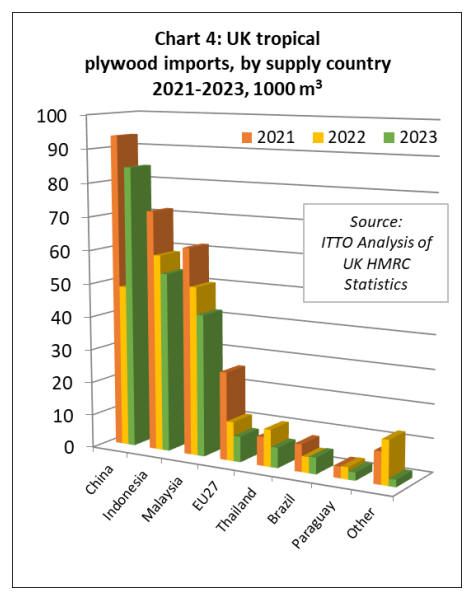
The UK imported 84,400 cu.m of plywood with an outer
layer of tropical hardwood from China in 2023, 74% more
than the previous year. This followed a sharp fall in UK
imports of Chinese products faced with tropical hardwood
in 2022 in favour of products faced with temperate
hardwoods.
The rebound in UK imports of tropical wood plywood
from China in 2023 may partly reflect UK buyers concern
to avoid importing Chinese plywood containing Russian
birch in contravention of UK sanctions on Russian wood
products imposed following the invasion of Ukraine in
February 2023.
UK imports of tropical hardwood plywood direct from
tropical countries fell 22% to 111,600 cu.m in 2023.
Imports were down 9% to 53,600 cu.m from Indonesia,
down 16% to 42,400 cu.m from Malaysia, down 45% to
6,100 cu.m from Thailand, down 4% to 4,900 cu.m from
Brazil and down 32% to 2,400 cu.m from Paraguay.
Meanwhile, the combined effects of supply shortages and
rising energy and other material costs on the European
continent continue to impact on UK imports of tropical
hardwood plywood from EU countries which were just
7,600 cu.m in 2023, 35% less than the previous year.
UK switches to indirect imports of tropical sawnwood
from the EU
UK imports of tropical sawnwood were 97,500 cu.m in
2023, 11% less than the previous year. Import value fell
10% to USD112 million during the year. Although UK
imports of tropical sawnwood held up reasonably well
compared to other tropical products in 2023, a larger share
was sourced indirectly, in this case from the EU, rather
than direct from the tropics (Chart 5).
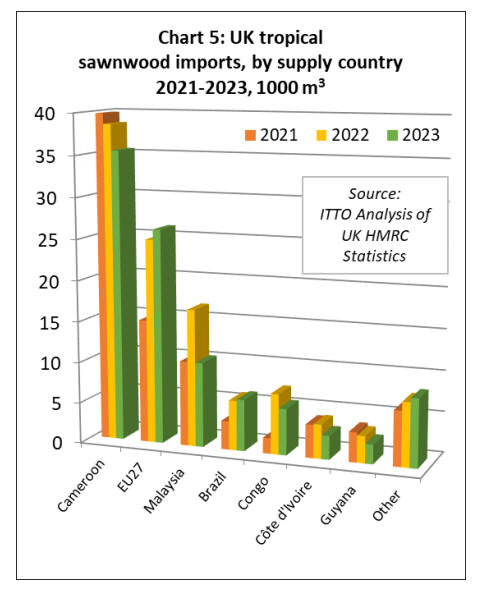
Indirect UK imports of tropical sawnwood via the EU
were up last year despite the economic slowdown and
Brexit disruption, increasing 5% to 26,200 cu.m. To some
extent, UK’s continuing dependence on indirect imports of
tropical sawnwood from the EU is due to a shortage of
kiln drying space in African supply countries combined
with lack of any hardwood kiln drying capacity in the UK.
A large share (36% in 2023) of sawnwood sourced directly
from the tropics by UK importers now comes from
Cameroon. UK imports of tropical sawnwood from
Cameroon were 35,500 cu.m in 2023, 8% less than the
relatively high level in 2022. UK tropical sawnwood
imports from Malaysia, which revived to some extent in
2022 after many years of decline, fell by 38% in 2023 to
just 10,400 cu.m.
UK imports of tropical sawnwood from Brazil were 6,200
cu.m in 2023, a gain of 3% compared to the previous year.
Imports from all other leading tropical supply countries
declined including Republic of Congo (-23% to 5,600
cu.m), Cote d’Ivoire (-30% to 2,900 cu.m) and Guyana (-
28% to 2,350 cu.m).
UK imports of tropical hardwood mouldings/decking fell
12% to 10,100 tonnes in 2023. Import value was down
20% to USD28 million. UK imports of mouldings/decking
declined sharply last year from Indonesia (-31% to 3,200
tonnes), Malaysia (-12% to 2,550 tonnes), and Brazil (-
74% to 440 tonnes).
In contrast, UK imports of this commodity group
increased three-fold from the Netherlands to 2,300 tonnes,
were up 147% from Vietnam to 790 tonnes, and increased
61% to 470 tonnes from Ghana (Chart 6).
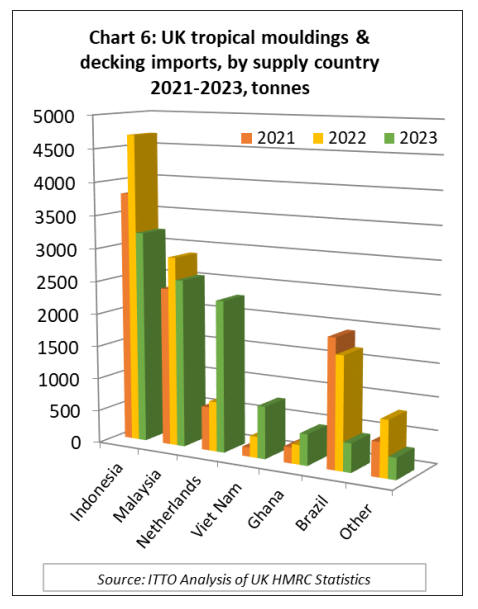
Mounting calls for delay to EU Deforestation
Regulation
In recent weeks a growing number of trade associations
and some politicians, many representing interests inside
the EU, have been raising concerns around the timetable
for implementation of the EU Deforestation Regulation.
The first real indication that the timetable may be slipping
came on 7 March 2024 when the Financial Times (FT)
published an article under the heading “EU delays stricter
rules on imports from deforested areas”
See:
https://www.ft.com/content/8dab4dc6-197b-4a2f-86f0-d5e83ce00b09
The story in this article is not as dramatic as implied by
the headline. It does not suggest any delay to the legal
requirements due to be imposed on EU operators from 31
December 2024 – prohibiting their trade in regulated
products from deforested areas. Only that “Brussels will
put off classification of countries into low, standard or
high risk, which was due to be implemented by December
[2024], instead designating every country as standard
risk”.
Drawing on information from “three EU officials”, the FT
claims that the “the EU intends to delay strict policing of
imports from areas prone to deforestation after several
governments in Asia, Africa and Latin America
complained that the rules would be burdensome, unfair
and scare off investors”.
The FT goes on to quote one “EC official” directly: “We
will simply not classify which means everywhere will be
medium risk — we need more time to get the system in
place. We have had a lot of complaints from partners. [The
delay] means no country will have an advantage over
another.”
While the FT article does not itself imply that other
aspects of the law’s implementation will be delayed, it
prompted an immediate response from EU trade and
industry associations who suggested that any delay to the
risk classification of countries required that the obligations
to be placed on EU operators must also be delayed.
The case for this wider delay in EUDR implementation
was made in a joint declaration issued on 12 March by six
European organisations, namely: the European
Confederation of Woodworking Industries (CEI-Bois), the
European Furniture Industries Confederation (EFIC), the
European Organisation of the Sawmill Industry (EOS), the
European Panel Federation (EPF), the European Timber
Trade Federation (ETTF), and the European Federation of
the Parquet industry (FEP).
The industry statement, which is available at
https://www.efic.eu/joint-statement-on-eudr, suggests that
“the benchmarking of countries is a central part of the
EUDR and its implementation, and any delays related to
this classification will only result in additional costs and
administrative burden for market actors, without any real
advantages either for the producing countries or for the
CAs [EU Member State Competent Authorities]”.
The statement goes on to suggest that under EUDR
“whether market actors source their commodities from
standard risk countries or from high-risk countries, they
are facing the same due diligence obligations. Simply put,
the benefit implied by the seemingly planned delay of the
country risk benchmarking does not exist because no
simplified procedure for export or imports is actually
foreseen for standard risk countries, compared to high risk
countries”.
The six European organisations signing the statement
expressed their regret that “the EUDR has become a huge
administrative and regulatory monster” and urged “the EU
institutions to delay the entry into application of the
EUDR for the operators and traders to amend the EUDR
in order to eliminate unnecessary bureaucratic hurdles and
to provide actors with sufficient time to adapt for full and
adequate compliance”. They also called on the European
Commission to “swiftly proceed with the classification of
the low-risk countries, with this action being its main
priority”.
Concerns about the implementation timetable for EUDR
were also raised by 19 wood trade organisations in France
in a joint letter to the French Environment Minister on 13
March. This states that, “all the trade organisations that
have signed this letter support the introduction of a legal
instrument to guarantee that wood and wood-derived
products have no impact on deforestation. However, the
principle of ‘strict traceability’ and the processes
envisaged by the EUDR are fraught with implementation
difficulties and still raise questions of interpretation”.
The letter goes on to make specific reference to the results
of the pilot test of the “information system” where due
diligence statements, including geolocation data of all
plots of land from which regulated products are harvested
must be entered for every consignment imported into, or
exported from, the EU market. The pilot test was
undertaken between December 2023 and January 2024.
The letter notes that “among the 112 European companies
taking part in this test were several French companies in
the forestry, wood and paper industry”.
After summarising six specific areas of weakness in the
information system based on the experience of the French
companies, the letter concludes that in view of “the
extraordinary complexity of this [legal] text, its legal
weaknesses and its many uncertainties….this European
Regulation is inoperable for both operators and traders”.
The signatories of the joint letter therefore call for a
revision of the EUDR after the European elections and ask
the French Environment Minister to raise the issue at a
meeting they say is scheduled on April 3rd about the
EUDR with the Belgian Presidency.
A sign of the mounting momentum behind the calls for a
delay to the EUDR came in a Reuters news report which
stated that at a closed-door meeting of the European
Agriculture and Fisheries Council on 26 March
“Agriculture ministers from 20 of the EU's 27 member
countries supported a call by Austria to revise the law”.
The report quotes a statement by Austria's agriculture
minister Norbert Totschnig that "We now urge the
Commission for a temporary suspension of the regulation
allowing for a feasible implementation accompanied by a
revision of the regulation". Reuters report that Ministers
from France, Italy, Poland, and Sweden were among the
supporters of this position.
Judging by comments of the German Federal Minister of
Food and Agriculture on the doorstep to the meeting on 26
March 2024, the call for delay is also supported by
Germany. The Minister welcomed the EUDR “as a
milestone […] for protecting the global forests […] and
human rights […]” but also emphasised that “during the
implementation the aim must be clear…the way must be
flexible”.
The Minister went on to note that “Germany is a low-risk
country, our forests are growing – an aspect that should
also be taken into account by other EU Member States”.
He called on the European Commission to “urgently
extend the actual transition phase” suggesting that “if it
does not quickly succeed in doing so, the law cannot be
implemented for Germany as it would result in an
unbearable workload for our economy, but especially for
our [Competent Authority] and SMEs” (the above is an
unofficial transcript of comments made by the Minister in
German (at 7:57 minutes) in the doorstep interview at:
https://newsroom.consilium.europa.eu/permalink/253320)
Legal and political obstacles to EUDR delay
While these calls are being made for a delay to EUDR
implementation, there appear to be very significant legal
and political obstacles to these being acted upon. As a
representative of the European Forest Owners Federation
(CEPF) has suggested (in the latest newsletter of the
German GD Holz wood trade association) “a
postponement is unrealistic, as this would require a new
legislative procedure involving the Parliament,
Commission and Council (the EUDR having already come
into force in mid-2023)”.
In public statements, European Commission officials are
not countenancing any talk of delay or flexible
interpretation of the law. According to the Reuters report
on 26 March, the EU Environment Commissioner
Virginijus Sinkevicius “questioned why countries had
raised concerns about the policy a few months before EU
Parliament elections in June, when they had spent years
negotiating the deforestation law and approved it last
year.” The Commissioner is reported to have told a news
conference that "of course, we will listen to the arguments,
but I honestly don't see any issues.”
Similarly, according to a MercoPress article, on 8 March
EC Environment envoy Emanuele Pitto told Paraguayan
exporters in Asunción that there “would be no turning
back from Rule 1115 [EUDR] banning raw materials and
products associated with deforestation and forest
degradation”.
The EC envoy emphasised to his Paraguayan audience that
“all those involved get acquainted with the regulation and
understand that the requirements are adapted to the needs
of consumers”. He said that “if Paraguay wants to
continue exporting to the countries of the bloc, if it is
interested, it will do so by adapting to the [EUDR]
requirements, but not of the European Union, but of the
consumers”.
This implied, said the envoy, that exporters wanting to
supply the EU must “demonstrate the origin of their
products and that they are free of deforested land, for
which the country needs a traceability tool or system that
can geolocate whether or not the product comes from
deforested land”. Furthermore in “case of non-compliance,
sanctions and confiscations would ensue”
See:
https://en.mercopress.com/2024/03/08/no-backtracking-on-rule-1115-eu-envoy-tells-paraguayan-producers).
The Financial Times returned to the subject of EUDR in
an opinion piece headed “The global downside of
European consumers’ green principles” published on 21
March. This comments that “Europe might be struggling
for long-term economic growth, but its regulatory
productivity is unsurpassed”
See:https://www.ft.com/content/9ace290e-e51d-4a5e-b853-decfc55ffeb2
The central observation of the FT article is that the EU’s
regulatory drive is not at all due to the ‘protectionist’
instincts of domestic producers in the EU. Instead,
“European public and consumer sentiment, or at least
campaigners’ influence, is now one of the most powerful
forces determining swaths of EU trade policy and hence
global regulation”. This observation seems borne out by
the fact that there seem to be at least as many objections to
EUDR implementation now coming from the wood-
working industry inside the EU, as from external suppliers
of the regulated commodities.
Environmental campaigning organisations were also quick
to criticise the calls for a delay to EUDR. In an “open
letter to EU governments” signed by 46 NGOs issued on
28 March the EU is urged to “uphold its commitment to
combat global deforestation and forest degradation both at
home and abroad”. “Any delay in implementation would
hamper its credibility," the NGOs wrote, adding: “We urge
all Member States to be at the forefront of a fast and
effective implementation of EUDR, instead of falling for
industries’ lobbying efforts.”
The NGOs open letter is at:
https://www.fern.org/fileadmin/uploads/fern/Documents/2024/The_EUDR_will_only_work_if_MS_start_implementation_now.pd
f
No expansion of regulations on imports
The UK Government has told members of parliament that
it does not intend to extend its forthcoming ban on the sale
of imported products linked to illegal deforestation to
cover commodities linked to deforestation that is
technically legal in the country of origin.
The possible implications for the tropical timber sector
will be addressed in the next issue of this report.
The UK government statement can be found at:
https://committees.parliament.uk/committee/62/environmental-audit-committee/news/200626/government-rejects-committees-call-to-prohibit-products-from-legal-deforestation/
|